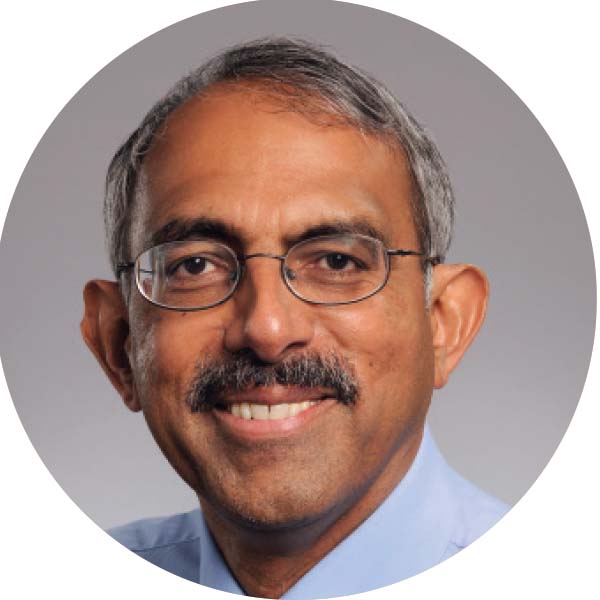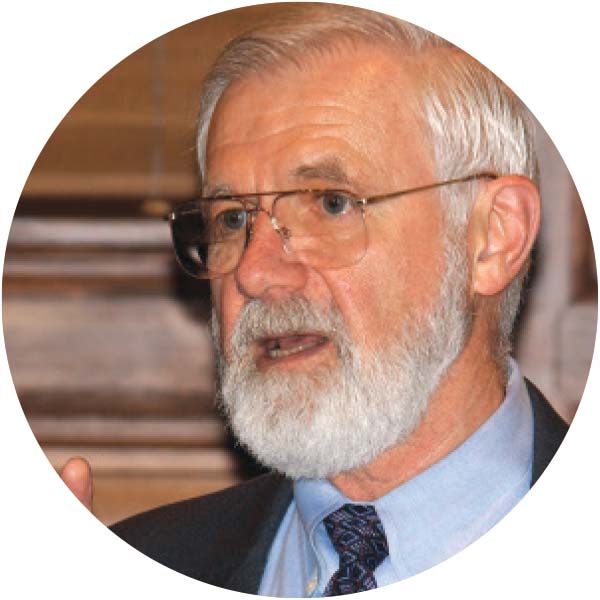‘Think Boldly’
WE MUST SHORE UP TRUST IN SCIENCE AND PUBLIC HEALTH

With the advent of the 21st century, science and technology were expected to be formidable forces that would improve population health and well-being. These forces would drive a rapidly changing and interconnected world, with communities and nations sharing common rewards (e.g., economic development, health, and welfare) and facing common risks (e.g., pandemics, chronic diseases, nuclear weapons, climate change). Effective governance and communications were to be cornerstones for this new era.
Venkat Narayan, Emory professor of medicine and Hubert Professor of Global Health and Epidemiology at Rollins 
Yet the response to the coronavirus disease 2019 (COVID-19) pandemic in the US, one of the world’s science and technological powerhouses, has not realized these hopes.
Instead, the pandemic has exposed critical weaknesses in the institutional systems specifically intended to protect and harness science and technology to promote personal and
public health.
History suggests that major crises such as wars, natural disasters, and pandemics can serve as a tipping point for proactive collective action. For example, reflection and lessons in the aftermath of World War II led to the creation of progressive institutions for that time, such as the United Nations and the World Health Organization (WHO).
James Curran, dean of Emory’s Rollins School of Public Health and professor of epidemiology
The current moment presents an opportunity to think boldly and to imagine a better world beyond the tragedy of the COVID-19 pandemic. Despite enormous scientific and technological accomplishments, such as the rapid development and testing of diagnostics, therapeutics, and vaccines, the response to the pandemic unveiled vulnerabilities in society and in the scientific independence of public health institutions.
There have been escalating attacks on science and expert opinion, an intrusion of partisan politics into public agencies, especially the Centers for Disease Control and Prevention (CDC) and the US Food and Drug Administration (FDA), and an absence of national coordination.
William Foege, Emory Presidential Distinguished Professor Emeritus of International Health at Rollins 
An added problem has been the spread of misinformation on social media, which has also undermined public trust in science and public health communication. It is concerning that large sections of society have displayed vulnerability to this erroneous information. There have been warnings about this possibility, as the US and other countries built a societal order based on science and yet ignore broader science education of the population.
The US must enhance knowledge and understanding of science and the scientific method to repair public trust in science and relevant institutions. Public understanding of science, along with effective communication from trusted sources, are critical to the implementation of evidence-based interventions to promote health and prevent disease.
More immediate measures are needed to strengthen nonpartisan political commitment for public health and to protect the scientific independence and voice of public health institutions. The following questions (and some recommendations) need thoughtful deliberation:
- Scientific discoveries must be understood and respected by the public. The remarkable cultural diversity in the US will require context- and culture-specific messaging and engagement. How can public communication be enhanced so that interventions supported by science are acted upon? How can education be improved to promote deeper understanding, knowledge, and trust in scientific principles?
- Processes are in place to strengthen science, such as peer reviews of studies and of the recommendations of expert committees. Nevertheless, it is critical that the public appreciates that knowledge is ever changing and new questions can emerge.
- What is needed for public policy and society to embrace this scientific temperament, and for science and the humanities to constructively embrace one another?
- Public health needs protection from the vagaries of partisan politics. What model of funding and governance can help to insulate public health institutions from short-term political concerns and position them to best serve the public, including anticipating and responding to public health emergencies?
- Scientific agencies need to be free and unfettered to reveal full scientific and public health information. For example, the director of the agency (e.g., CDC) and the senior scientists should be expected to share uncensored scientific information and data with the public and to discuss facts with the media without constraints. What mechanisms can protect these functions?
- A public health system oriented toward prevention and proactive measures will be best equipped to encounter a pandemic and respond to other ongoing health challenges.
- Greater international engagement is paramount to ensure public health cooperation. There is increasing interconnectedness between science and public health and international economics, politics, and policy. Helping other countries prevent and control contagious diseases and promote health not only benefits those nations but also contributes to US domestic health security, well-being, and global leadership. How can we foster greater global collaboration in science and in public health
The CDC and FDA were created 75 and 115 years ago, respectively, each in response to a local health threat. The world is a far smaller place today than 100 years ago, with climate change and pandemics as global problems. To deal with these problems will require changes to the governance structures of public health institutions and a rebuilding of public trust.
Email the Editor







